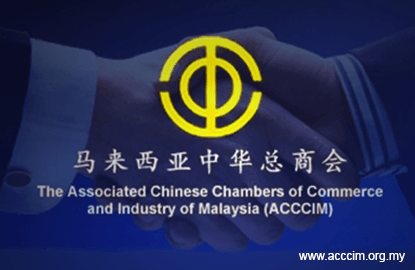
This article first appeared in Corporate, The Edge Malaysia Weekly, on May 23 - 29, 2016.
WE can no longer do business in isolation. Everything is interdependent and inter-related,” says Tan Sri Teo Chiang Kok, director of See Hoy Chan Holdings Group.
Today’s business leaders need to closely monitor developments in currencies, interest rates and a myriad of other issues — and not just those in their own industries — as the world gets smaller and people and economies become more connected and interdependent, says Teo, who is deputy secretary general of the Associated Chinese Chamber of Commerce and Industry of Malaysia (ACCCIM).
Meanwhile, Teoh Kok Lin, deputy chairman of ACCCIM’s Socio-Economic Research Committee, notes that there are three megatrends, namely geopolitics, economy and technology, that are changing the way business is conducted, and reshaping the economic and commercial landscape. Simultaneously, they are creating business opportunities, not only for large corporations but also for smaller and mid-sized ones as well as new start-ups.
“The old normal of doing business is no longer relevant. We are moving to a new normal,” adds Teoh, the deputy chairman of ACCCIM’s think tank Socio-Economic Research Centre.
It is with this in mind, and how the traditional business cycle and business models are being challenged and reshaped, that ACCCIM is organising the inaugural SERC Global Economic Conference 2016 on May 30.
Themed “Geopolitics, Economy, Technology — The New Normal”, the one-day global economic conference, to be conducted in English, will see experts in the areas of geopolitics, economy and technology share their insights.
“Not so long ago, we talked about the emergence of China, India and Brazil. But now, where is Brazil? Things get obsolete and the pace of change is fast. As businessmen, we have to able to adapt and adopt quickly. Otherwise, we will be left behind,” says Teo, who is chairman of the organising committee.
ACCCIM president Datuk Ter Leong Yap hopes the conference will eventually become an annual event that business leaders will look forward to. “The topics we have chosen are very much related to business and at the same time, affect people’s day-to-day lives,” he says.
“The conference is structured in a way that is more conversational, rather than a lecture-centric one, so it will be more thought-provoking,” Teoh adds.
One of the highlights will be the invited speakers, both local and foreign. The sessions, based on various themes (two on geopolitics, and one each on economy and technology), will see an equal participation of speakers or panellists from home and abroad.
Among the speakers will be Alastair Newton, a former career diplomat with the British foreign service and former senior political analyst at Nomura International PLC, who will speak on geopolitics.
“We are moving from a unipolar world to a multipolar world where there is no longer just one dominant power, but multiple. With that, we will see a lot of changes that would have significant implications on government policies, multilateral policies, [which will] impact businesses,” says Teoh.
He thinks it will be interesting to learn more about this transition to a multipolar world, its impact, and how corporate leaders can grab opportunities to grow their businesses during the session on geopolitics.
Another speaker is Tunku Zain Al’ Abidin Tuanku Muhriz , director of the Institute for Democracy and Economic Affairs (IDEAS). Dr Oh Ei Sun, a Senior Fellow at the S. Rajaratnam School of International Studies, Nanyang Technological University, Singapore, who used to serve as political secretary to Prime Minister Datuk Seri Najib Razak, will be moderating the session.
In the session on economy, topics for discussion include China’s One Belt One Road initiative and the Asean Economic Community (AEC), which may not be new to those who follow the developments in China and Asean, but remain no less relevant now than when they were first introduced.
Invited speakers for this session include Prof Hai Wen, the founding dean of HSBC Business School at Peking University, China, and Eddy Tambato, senior partner and managing director of the Boston Consulting Group, Jakarta.
Sharing their thoughts on the future and the impact of disruptive technology and the opportunities they create will be Prof Cui Zhanfeng from the University of Oxford and Dr Shinsuke Sakakibara, Fanuc Corp executive officer and senior technical executive of its robot business division.
“It takes years for hotel chains like the Hilton (Hotels & Resorts) and Shangri-La (Hotels & Resorts) to build their hotel empires. But with the use of technology, Airbnb was able to emerge as the world’s largest accommodation provider, without owning even one room, in just a few years. We also see companies like Uber becoming the largest taxi-provider firm,” Ter says, citing examples of how disruptive innovation changes the game.
The SERC Global Economic Conference is not limited to ACCCIM members. The participation fee is RM300 for members of ACCCIM constituent chambers and RM1,000 for non-members.
Save by subscribing to us for your print and/or digital copy.
P/S: The Edge is also available on Apple's AppStore and Androids' Google Play.